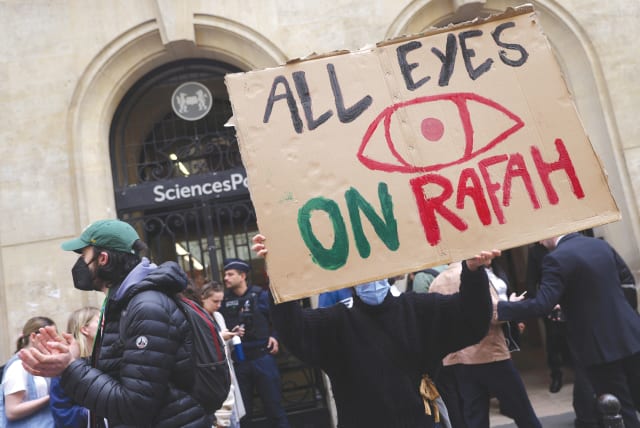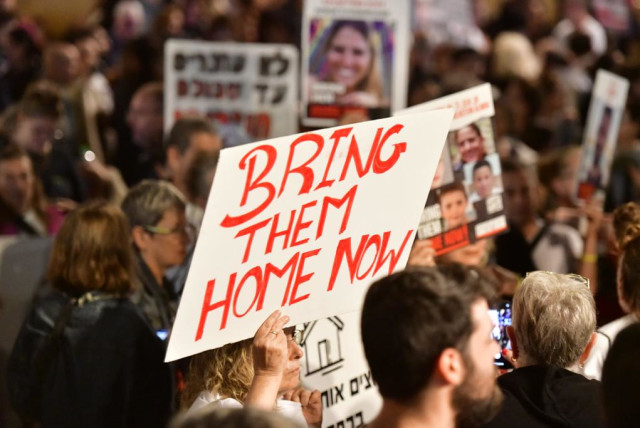The hostages' suffering demands urgent action - opinion

The human rights of the hostages are being unjustly denied. If your eyes are on Rafah but are not also looking for the hostages, then you are betraying humanity and accepting injustice.
Seventeen world leaders have made a long-overdue call demanding that Hamas release all the remaining hostages in Gaza who have been held captive for nearly eight months.
It seems the world still does not comprehend our dire situation. There are 125 hostages ranging in age from one year old to 86. Young women are reportedly still being sexually assaulted by their captors, a concern even acknowledged by the United Nations. This is something we cannot and will not ignore.
Why does the world fail to grasp this? Some pro-Hamas activists attempt to draw a moral equivalence between the hostages held by Hamas and Palestinian prisoners in Israeli jails. While there is a legitimate conversation to be had about specific issues within the Israeli jail system, it is in no way equivalent to being held captive by a terrorist group.
Tara D. Sonenshine captured the issue in her recent op-ed in The Hill, where she wrote, “Hostages are not prisoners. They are not charged with any crime. There is no due process. Their fate is in the hands of those who abduct them. In most cases, their kidnappers treat them in an inhumane way, using them as bargaining chips for reaching diplomatic or financial goals, or even simply to demonstrate prowess.”
Hostages are often innocent individuals forcibly taken and used as leverage by criminals or political entities to achieve specific aims. In contrast, convicted prisoners in Israeli jails were arrested for crimes they committed. While pro-Hamas activists try to create a convoluted moral equivalency, the reality is that most of these convicted prisoners walk away with a university degree. With the exception of the minority of prisoners who are in administrative detention (taken because of involvement in terror activity), the prisoners’ cases are all filed and available to the public, as is their membership in various terror organizations. Israel is bound to secure prison conditions according to two international treaties: the International Covenant on Civil and Political Rights and The Convention against Torture and Other Cruel, Inhuman or Degrading Treatment or Punishment. Prisoners in Israel receive a lawyer, medical treatment, education, and visitation rights (both family and the Red Cross); they can receive stipends from the Palestinian Authority, and they have access to radio and television. They are even allowed visits by Knesset members.
Anyone attempting to create a moral equivalency between a hostage and a prisoner in Israel is being disingenuous and is whitewashing the atrocities committed by terrorist groups and non-state entities. It is akin to equating the situation with the 350 hostages, the vast majority being women and children, who were held by Boko Haram, a terrorist organization based in northeastern Nigeria.
Nigerian forces rescued the hostages from the Sambisa Forest, and some of the girls gave birth, likely as a result of forced marriages during their captivity. Boko Haram aims to establish Sharia law and has kidnapped at least 1,400 students from Nigerian schools. No one in their right mind would compare these Nigerian hostages to convicted prisoners, so why is it acceptable to draw parallels with the hostages held by Hamas, a group similar to Boko Haram?
There is also the example of the Yazidi women and girls in Iraq who were kidnapped by ISIS and subjected to brutal treatment, including forced marriage, sexual slavery, and forced conversion to Islam. Imagine anyone trying to whitewash what these Yazidi women were forced to endure. Why is it acceptable when it happens to Jewish people?
Every day, hostages are taken, particularly by fundamentalists who wield them as weapons of war. This constitutes a war crime and a violation of international law, which stipulates stringent measures against hostage-taking. Various international instruments and conventions, such as the International Convention Against the Taking of Hostages (1979), the Geneva Conventions (1949), and the Rome Statute of the International Criminal Court, delineate the illegality and repercussions of such actions. Despite this, the history of hostage-taking by Hamas and other Palestinian terror groups is often overlooked in mainstream discourse and sometimes even labeled as a form of “justified resistance” by certain elite college students.
New depths of inhumanity
THE LEVEL of cruelty faced by Israelis over the past eight months, exemplified by the recent “All Eyes on Rafah” campaign, which fails to acknowledge the discovery of hostages in Rafah, signifies a new depth of profound inhumanity and disregard for Jewish life. While this campaign was seen by hundreds of millions and endorsed by prominent celebrities, many with noble intentions, it glaringly omits the crucial reason for Israel’s presence in Rafah.
In February, Israel executed a complex targeted operation in Rafah, resulting in the rescue of two living hostages, brothers-in-law Fernando Merman (60) and Luis Har (70). It is suspected that several others are being held captive in Rafah alongside some of Hamas’s last remaining brigades.
Taking hostages is a cruel tactic employed by the Islamic Republic and its terror proxies. Not a single one of these hostages has been seen by the Red Cross or any other humanitarian organizations. As the world deliberates over Rafah and blames Israel for the suffering, it’s paramount to remember why we are in there and that hostages are suffering – their faces unseen, their voices unheard.
Their suffering is not a statistic to be debated or a pawn in a geopolitical game. It’s a profound tragedy that demands urgent action and unwavering solidarity. Their human rights are also being unjustly denied. If your eyes are on Rafah but are not also looking for the hostages, then you are betraying humanity and accepting injustice.
The writer is a social media activist with more than 10 years of experience working for Israeli and Jewish causes and cause-based NGOs. She is the co-founder and COO of Social Lite Creative, a digital marketing firm specializing in geopolitics.
Jerusalem Post Store
`; document.getElementById("linkPremium").innerHTML = cont; var divWithLink = document.getElementById("premium-link"); if (divWithLink !== null && divWithLink !== 'undefined') { divWithLink.style.border = "solid 1px #cb0f3e"; divWithLink.style.textAlign = "center"; divWithLink.style.marginBottom = "15px"; divWithLink.style.marginTop = "15px"; divWithLink.style.width = "100%"; divWithLink.style.backgroundColor = "#122952"; divWithLink.style.color = "#ffffff"; divWithLink.style.lineHeight = "1.5"; } } (function (v, i) { });

